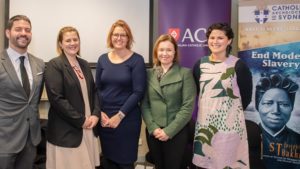There was standing room only as executives from over 40 Catholic institutions and agencies across Australia’s health, aged care, education and social services sectors serving hundreds of thousands of people came together at a world-first conference in Sydney, Eradicating Modern Slavery from Catholic Supply Chains. The conference was convened to coincide with the United Nations World Day Against Trafficking in Persons on 30 July 2019.
Supply Chain Sustainability School CEO, Hayley Jarick, was delighted to be asked to share a case study on how the school is working to support the industry to eradicate modern slavery. Hayley said, “The School’s free online library includes a number of modern slavery resources that all Catholic institutions can use today to educate their organisations, their suppliers and their customers. The School is eager to partner with all organisations to improve the social, environmental and economic sustainability of supply chains.”

Thank you to the team at the Sydney Archdiocese Anti-Slavery Taskforce for putting on an insightful and motivational program, specifically thank you Chair, John McCarthy QC, Executive Officer, Alison Rahill, and Executive Manager, Jenny Stager.
Other presenters included:
• Most Rev Richard Umbers DD VG EV, Auxiliary Bishop of Sydney
• Michael Digges, Administration and Finance, Archdiocese of Sydney
• Nicole D’Souza, Konica Minolta Australia
• Alexander Coward, Business Engagement Unit, Department of Home Affairs
• Martijn Boersma, University of Technology Sydney and Centre for Business and Social Innovation
• Angela Bell, Ethical Clothing Australia
• Poonam Datar, Cleaning Accountability Framework
• Paul Egan, AMP Capital
• Jane Mansfield, Australasia – Asaleo Care
• Anthony Smith, Sydney Catholic Schools
• Genevieve Alexander, St Vincent’s Health Australia
• Sr Noelene Simmons, ACRATH
Amongst many practical tips for those tasked with implementing actions to eradicate slavery was Alexander Coward’s bonus 6 tips (in addition to the Department’s guidance) for implementing the Australian Modern Slavery Act. They were:
1. The biggest spend may not correlate with the biggest risk
2. Be clear about why you need to address modern slavery with stakeholders
3. Look at what are you already doing and how this can be used to address modern slavery
4. You’re not alone – there are many groups you can collaborate with
5. Demonstrate a plan for continuous improvement over time
6. Remember this process is about people
Cambodian-born slavery survivor and author, Vannak Anan Prum also launched his graphic memoir in Australia which captures his experience of being trafficked on a fishing boat, escaping and then being sold again by his rescuers to slavery on a palm oil plantation.
